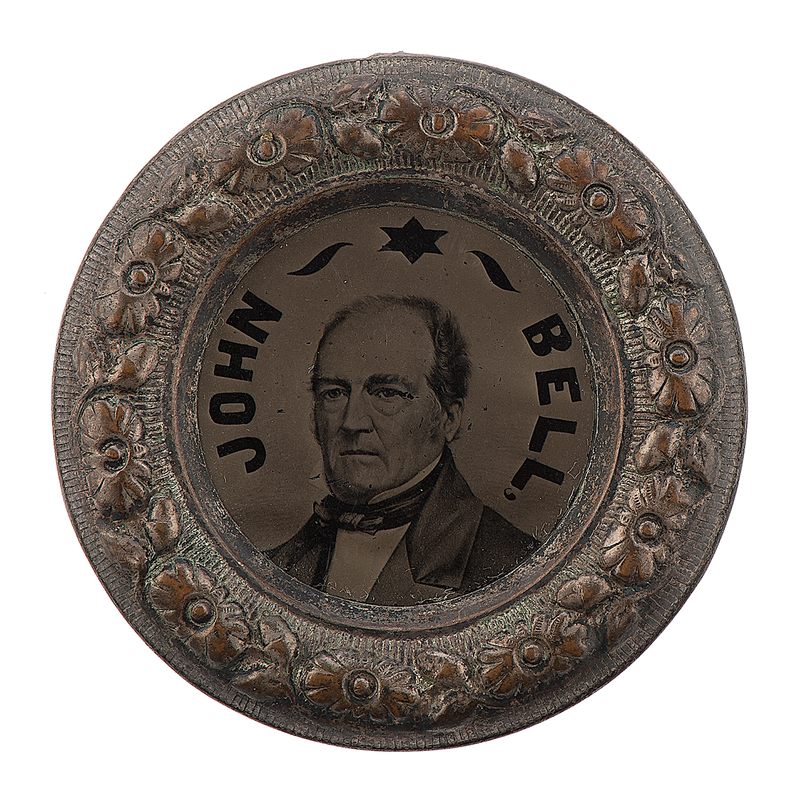Oval albumen photograph of Tennessee politician John Bell 5.25 x 7.25 in., on 7.25 x 9.5 in. mount credited to Whitehurst Gallery, Washington, DC. John Bell (1796-1869) was an important figure in antebellum politics, serving in the federal government in an array of capacities before vying for the presidency in the critical election of 1860. Bell, like many politicians, began his professional career as a lawyer, graduating from Cumberland College in Nashville in 1814. Bell quickly became involved in the public sector, testing the political waters as a Tennessee State Senator in 1817, and fully immersing himself as a delegate to U. S. House of Representatives ten years later. Amidst Bell's tenure as a Congressman, he began associating with the budding Whig party, where he ascended to leadership positions within the group, including a short-lived appointment as Secretary of War under Whig President William Henry Harrison in 1841. Bell continued representing his native state at a federal level from 1847-1859 when he served as a U. S. Senator while the Whig party controlled the state legislature. His most enduring political legacy, however, remains his candidacy for President of the United States during one of the most important elections in the nation's history. Representing the ex-Whigs and moderates who formed the Constitutional Union Party, Bell and his running mate, Edward Everett of Massachusetts, were one of the contending tickets in the 1860 election. Bell won majorities in border states such as Kentucky, Virginia, and Tennessee, where his message that secession was unnecessary, due to the Constitution's protection of slavery, resonated with voters. Bell actually met with the newly elected President Lincoln in March of 1861 to discuss such matters. Being a Unionist himself, Bell was staunchly against secession; however, after the events at Fort Sumter the next month, Bell, like so many others, had to make a decision. He sided with the Confederacy, stunning Unionist leaders in the north. Once Tennessee seceded, Bell retired from public life for good, perhaps soured by siding with a cause in which he did not fully believe. Condition: Photograph is somewhat faded, with wear and discoloration at edges, along with age spotting and discoloration to mount.
Oval albumen photograph of Tennessee politician John Bell 5.25 x 7.25 in., on 7.25 x 9.5 in. mount credited to Whitehurst Gallery, Washington, DC. John Bell (1796-1869) was an important figure in antebellum politics, serving in the federal government in an array of capacities before vying for the presidency in the critical election of 1860. Bell, like many politicians, began his professional career as a lawyer, graduating from Cumberland College in Nashville in 1814. Bell quickly became involved in the public sector, testing the political waters as a Tennessee State Senator in 1817, and fully immersing himself as a delegate to U. S. House of Representatives ten years later. Amidst Bell's tenure as a Congressman, he began associating with the budding Whig party, where he ascended to leadership positions within the group, including a short-lived appointment as Secretary of War under Whig President William Henry Harrison in 1841. Bell continued representing his native state at a federal level from 1847-1859 when he served as a U. S. Senator while the Whig party controlled the state legislature. His most enduring political legacy, however, remains his candidacy for President of the United States during one of the most important elections in the nation's history. Representing the ex-Whigs and moderates who formed the Constitutional Union Party, Bell and his running mate, Edward Everett of Massachusetts, were one of the contending tickets in the 1860 election. Bell won majorities in border states such as Kentucky, Virginia, and Tennessee, where his message that secession was unnecessary, due to the Constitution's protection of slavery, resonated with voters. Bell actually met with the newly elected President Lincoln in March of 1861 to discuss such matters. Being a Unionist himself, Bell was staunchly against secession; however, after the events at Fort Sumter the next month, Bell, like so many others, had to make a decision. He sided with the Confederacy, stunning Unionist leaders in the north. Once Tennessee seceded, Bell retired from public life for good, perhaps soured by siding with a cause in which he did not fully believe. Condition: Photograph is somewhat faded, with wear and discoloration at edges, along with age spotting and discoloration to mount.














Testen Sie LotSearch und seine Premium-Features 7 Tage - ohne Kosten!
Lassen Sie sich automatisch über neue Objekte in kommenden Auktionen benachrichtigen.
Suchauftrag anlegen